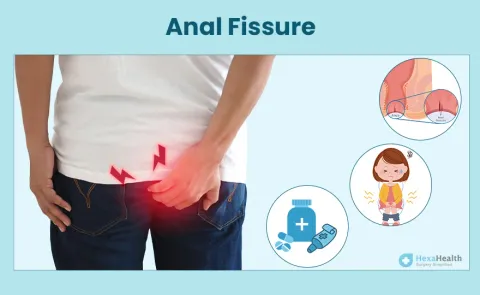Non-Surgical Treatments
In most cases, anal fissure treatment at home can be used, like making some dietary changes and increasing fluid intake. However, if they don't work, there are fissure treatments without surgery; these include:
-
Applying nitroglycerin externally (Rectiv) can improve blood flow to the fissure, aiding in anal fissure pain relief and helping relax the anal sphincter.
-
Nitroglycerin is typically the preferred anal fissure cream if other conservative methods don't work. Side effects can include severe headaches.
-
Using topical numbing anal fissure creams like lidocaine (Xylocaine) and glyceryl trinitrate ointment can help relieve pain.
-
Injecting OnabotulinumtoxinA (Botox) to paralyse the anal sphincter muscle and reduce spasms temporarily.
-
Sometimes doctors may prescribe blood pressure medications like nifedipine or diltiazem for relaxing the anal sphincter. These drugs are usually applied to the skin but can also be taken orally, though this increases the risk of side effects.
Ayurvedic Treatment for Anal Fissure
The natural remedies are generally safe. Let us look at the anal fissure cure by Ayurveda:
-
Jatyadi Oil: This heals cracks in the anal region and also alleviates itching, burning, and irritation. For severe fissures, it’s often used with Ayurvedic medicines like Rajat Bhasma and Gandhak Rasayana.
-
Yashtimadhu Churna: It helps soothe anal fissures by balancing the aggravated Vata and Pitta doshas.
-
Gandhak Rasayana: Prevents infections and supports the healing process of anal fissures.
-
Triphala Guggulu: Helps prevent constipation, softens stool, and provides pain relief, aiding in the management of anal fissures. For mild constipation, consider using Gulkand or Triphala Churna.
Homoeopathy Treatment of Anal Fissure
One should consult an expert homoeopathy doctor before consuming the anal fissure medication, that tare as follows:
-
Graphites: A top homoeopathic remedy for anal fissures, especially for obese patients with constipation and hard, knotty stools.
-
Nitric Acid: Treats sharp pain and tearing sensations in the anal or rectal region, often accompanied by discharge and straining during bowel movements.
-
Ratanhia: Used to alleviate pain during anal fissures.
-
Paeonia: Primarily treats discharge and internal chilliness in the rectal region associated with anal fissures.
-
Aesculus: Addresses dryness, aching, soreness, burning sensation, itching, and throbbing pain in the anus after passing stool.
Heal Anal Fissure Fast (Surgical Treatments)
Anal fissure surgery is performed by a proctologist, anorectal or general surgeon. It is aimed at repairing the fissure and promoting healing. Common types include:
-
Fissurectomy: This surgery removes the anal fissure. It also removes the edges of the fissure and surrounding worn-out skin.
-
Lateral Internal Sphincterotomy
: The surgeon makes a small incision in the internal anal sphincter muscle. It reduces spasms, relieves pressure on the fissure, and promotes healing.
-
Laser Treatment for Fissure
: It is an innovative technique that uses a focused laser beam to eliminate scarred tissue in the affected area. Also known as laser sphincterotomy or laser fissurectomy, this procedure is completed within 15 to 20 minutes.
-
Advancement
Flap: In this anal fissure surgery, the surgeon creates a flap of healthy tissue. The flap replaces the affected area in the fissure.

"In my experience so far, I remember treating an anal fissure for a young woman who had been suffering for months. I implemented a combination of modern surgical techniques with traditional Ayurvedic treatments.
We managed not only to heal her fissure but also to improve her quality of life. This experience solidified my belief in integrating holistic treatment with conventional medicine.”
- Dr. Aman Priya Khanna
General Surgeon
Estimated Anal Fissure Operation Cost
The cost of laser surgery for fissures in India depends on several factors, including the surgeon's expertise and the hospital facilities.
Note: Patients should talk with HexaHealth consultants for up-to-date financial information.











































